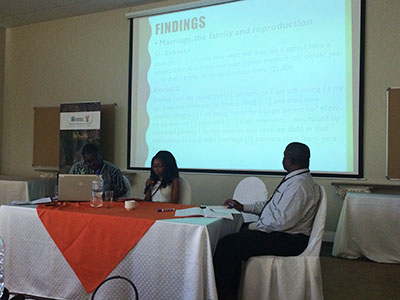
The 7th African Population Conference (APC) ran for a period of five days from the 30th of November to the 4th of December (2015) and was held in Pretoria at the St Georges Hotel and Conference Venue. By the close of the conference, more than 800 delegates had been registered with participants coming from 58 countries, of which 38 were African. Countries represented by fifteen or more delegates were Nigeria, Ghana, Uganda, Cameroon, Kenya, Burkina Faso, the United States of America and France. Over half of the 800-plus delegates were from South Africa.
In the opening ceremony of the conference, the theme of the conference, Demographic Dividend in Africa, was introduced by Statistician General, Mr Pali Lehohla. Papers presented at the conference thus spoke to obstacles preventing full productivity, economic growth and development or presented data for how things stand thus far in terms of economic growth and development in the region. Topics covered within the conference included the following: sexual and reproductive health; family planning; maternal, new born and child health; children, youth and transition to adulthood; marriage and family; population and gender; and HIV/AIDS, STIs and sexual behaviour (for a look at other topics covered by the conference the website is provided below). During the opening ceremony, the Honourable Minister of Social Development, Ms Bathabile Dlamini, gave a welcoming address. In it, she called upon reproductive rights activists to do more: to work to enact the policies fought for and put their own research to work. In closing her address and concluding the opening ceremony, she asked delegates to engage in meaningful debate during the conference and to keep in mind that the decisions taken at, and as a result of, the conference will affect the lives of real people.
On Tuesday, my colleague and I had the pleasure of attending a panel presented by the Sexual and Reproductive Justice Coalition. The papers presented marked a welcome shift from the general theme of the conference. The presentations and the discussion that occurred afterwards exemplified the minister’s words. The papers presented during the session spoke to challenges to the implementation of the Choice on Termination of Pregnancy Act, the decriminalisation of sex work, access to sexual and reproductive health rights from the perspective of gender minorities, and gaps in the medical school training of health service providers. From the discussion that followed the presentation, a number of important observations were made in relation to (in)access to sexual and reproductive health services and the implications for sexual and reproductive justice. I only mention a few here.
Speaking from her own experience of abortion service provision, one speaker made the observation that when those involved in health care give better quality of care to women accessing post-abortion care after having resorted to terminating the pregnancy themselves or accessing illegal abortion providers compared to women who use designated abortion facilities, the message being sent is that health care systems encourage backstreet abortions. Similarly, when health service providers draw on assumptions around gender that create obstacles which prevent transgendered men and women face from accessing sexual and reproductive health services (both gender-affirming and non-gender-affirming), a certain message is being conveyed. As the speaker concluded, this gate-keeping of healthcare results in the violation of the medical ethics of beneficence, non-maleficence, patient autonomy and distributive justice.
In response to an audience member’s suggestion that something could be done to help sex workers find other, ‘better’, work, the presenter on sex work decriminalisation stated that decriminalisation is necessary so that sex work can be recognised as work and those in sex work afforded the same level of protection and recourse to justice that say a lecturer or a nurse would. In this moment, what was exposed to me was how statements like those made by the audience member draw upon discourses of what is and isn’t acceptable work and about who has rights to their bodies. Importantly, this is done in ways which mask the operation of these discourses.
The following day, my colleague, Malvern Chiweshe, and I presented a paper: “Justifying the decision to terminate pregnancies: Comparisons of women’s narratives from South Africa and Zimbabwe”. We were more than a little nervous as we anticipated that we would probably be among demographers and statisticians who might ask questions that we felt were not so relevant to the studies we were presenting on, or who might ask us to do quite a bit of explanatory work. Apart from one question (what were our hypotheses?), those who did engage with our presentation did so meaningfully, suggesting, for example, that we could speak to ‘motherhood ideals’ as most people react with surprise to learn that motherhood often figures in women’s decision-making with regard to abortion (the assumption being that all women who terminate pregnancies do so to refuse the ‘duty’ of motherhood).
The APS conference created a space for critical debate to occur on a variety of topics. In all the sessions my colleague and I attended, the audience engaged the presenters in lively discussion which sometimes continued over lunch. In his address during the closing ceremony, Mr Jeff Radebe, Minister in the Presidency, said that he hoped that the conference had provided an opportunity for us to learn from the lessons of the past (and present). It is my hope, that we use the knowledge shared and gained at the conference to create a society in which there is sexual and reproductive justice for all.
Jabulile Mavuso
References:
http://uaps2015.princeton.edu/
